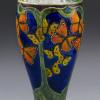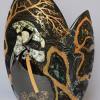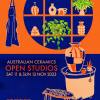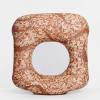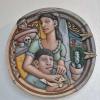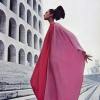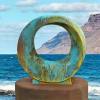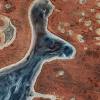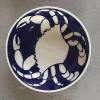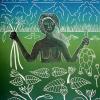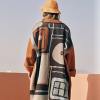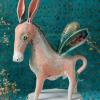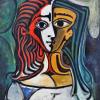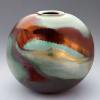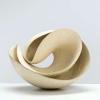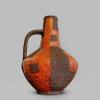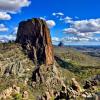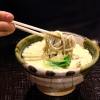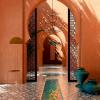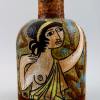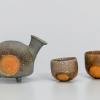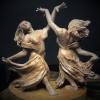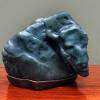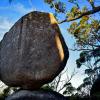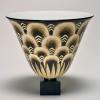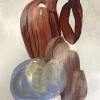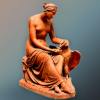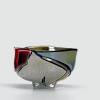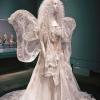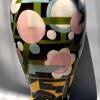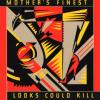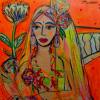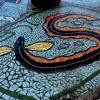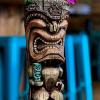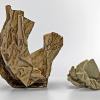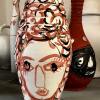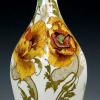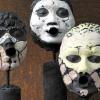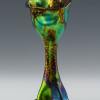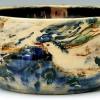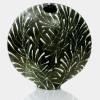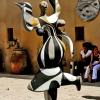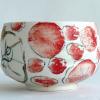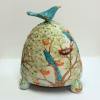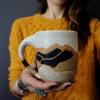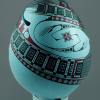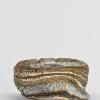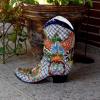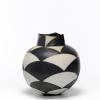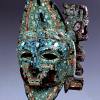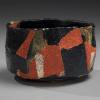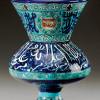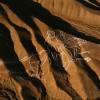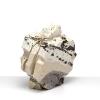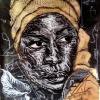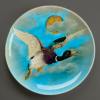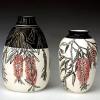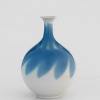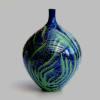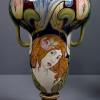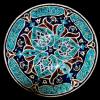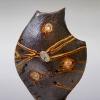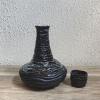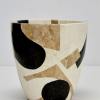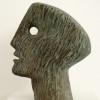Carved African terracotta pot
Art is an integral feature in defining a culture and all the mysteries, diversity and complexities of Africa can be found in their artistic expression. Terracotta sculptural figures and heads were discovered from the Nok culture of Nigeria dating back to 500 BC and they demonstrated a strong abstract figural interpretation in their art. The Kongo people and the Sherbro from Sierra Leone were famous for their stone sculptures while the Benin were known for their ivory carving. The origin of the bronze casting tradition began with the Igbo-Ukwu tribe of Nigeria around the 9th century AD and reached its pinnacle with the Ife people from Yoruba.
Malangatana Valente Nguenha
As various African kingdoms accumulated riches through trade of gold, agriculture, precious stones, cloth and other goods, the health and appearance of their rulers were considered to be an important metaphor for their kingdoms strength and stability. Ceremonial occasions were a demonstration of splendor and power and the wealthy kingdoms were active patrons of the arts and had their own guilds of exclusive artists. Precious works of art were commissioned for personal and devotional use. The court of Benin ( Nigeria ) exemplifies this and many exquisite pieces in the form of masks, sculptures and jewelery were created. Other artists, outside the court, sometimes recreated these pieces, especially the carved sculptures, for commercial trading.
The shamans and power association leaders of a tribe cultivated the ability to wield natural resources and spiritual energies through their masks, sculptures and performances, where their understanding of plants, animals and spirituality were on display. Organic and inorganic materials such as flora, feathers, horns, porcupine quills, herbs and other elements became incorporated into their arts by adding them to their masks and sculptures.
The acquisition and maintenance of masks, sculptures, and other artistic symbols of power constituted a significant part of a specialists’ training. The artistry was usually shrouded in secrecy including the materials used and the identity of the artist, who were held in high regard for their skill and reverence.
The aristocracy and attendants wore pendants and carried objects bearing symbols of political and spiritual power. For most of the African kingdoms, the royal families and their ancestors were venerated in the form of brass cast and wood carved statues which were displayed on royal alters.
A mask from Cameroon Savannah – Bamileke master Bamendjo
Nineteenth century, Rietberg Museum
Recognizable for their imposing forms with swollen cheeks and plump, big eyes. These masks were worn on the head like a crown. They were invested with a crucial role during the commemorations and the election of the king.
—
African art has been a dynamic source of inspiration for numerous Western artists. The highly stylized treatment of the human figure in African sculptures had a direct input into the development of the avant garde movements of the modern art of Matisee and Picasso and the painting styles of post-Impressionists Cézanne and Gauguin. Modernist artists were drawn to African sculpture and art because of its sophisticated approach to the abstraction of the human form. Modigliani made sketches of the elongated heart shaped faces of Baule masks and this became an influence in some of his sculptures and paintings. Likewise Constantin Brancusi, Modigliani’s friend, introduced stylized elements into his sculptures. Picasso claimed that African sculptures had helped him to understand his purpose as a painter, which was not to entertain with decorative images, but to mediate between perceived reality and the creativity of the human mind—to be freed, or “exorcised,” from fear of the unknown by giving form to it.
Dogon sculptures, Bandiagara Hills, Mali – Africa
The figure in the foreground is attributed to the ‘Master of the Ogol’
Dallas Museum of Art
Stylized Cameroonian Woman sculpture with beads
Anthropomorphic bark box, depicting the women’s headdress and cranial modification achieved by binding the heads of babies among the Mangbetu
Handpainted ceramic pot from Zimbabwe – livingstoneart.be
A staff used by devotees of Shango, the Yoruba orisha of thunder and lightning, carried in dancing rituals.
Idoma wooden multiple faced Ungulali headdress, Nigeria
20th century
An Ashanti gold pendant in the form of a stylized head. – Ghana
Wooden complex–Nigeria 20th century
British Museum
Ivory Coast sculpture of a Senufo seated female figure surmounted by a bowl and a bird
Bonnie Ntshalishali lidded vessel for Ardmore, ZA
\
Idia, the mother of Oba Esigie, was granted the right to establish her own palace and ancestral altars as a reward for using her mystic powers to assist in victory in Benin’s war against the Igala.
Brass weight for weighing gold dust in the form of a horse and rider
Ghana
South African- Mulondo Water Vessel,
An anthropomorphic soapstone carving from an ancient site of Great Zimbabwe
British Museum, London
Small polychrome pottery Ideqqi – Berbers – North Africa
Geometric patterns that adorn the pottery made by Maghreb women – found on textiles and female tattoos – carry out a symbolic meaning which dates back to Neolithic times.
bruno-mignot.com
Burkina Faso—Nuna ceramic storage jar
Shona sculpture Protective Mother – Patrick Fredy, Zimbabwe
Masengo Gallery
African Senufo Ceremonial Drum-(Pinge)
Nigerian artist Sokari Douglas Camp bronze sculpture of Chief Aramchree
contempafricanart.com
Chiefs stool supported by kneeling woman, attributed to the master carver of his workshop, known as Master of Buli. Democratic Republic of Congo
 Dancing Figure – Nigerian sculptor Benedict Enwonwu
Dancing Figure – Nigerian sculptor Benedict Enwonwu
( Afro Au Go Go }
Mwana Pwo dance mask, regarded as an idealised depiction of a beautiful young girl, showing facial scarification
African terracotta pot
Dick Jemison Tribal Art Collections
Ethiopian lidded string jar
Old Turkhana String Jar, Ethiopia An old Turkhana jar made of twisted cord in a vertical pattern covered with hardened clay and a fitted lid. Coated on the inside with a clay-like material.
Mali Face Mask, Late 19th early 20th-century
Yoruba female Figure with Rooster Offering Bowl (Olumeye),
Late 19th early 20th century, Nigeria
Tembe Folk Art Gourd, South Africa / Mozambique
Hennie Meyer pitcher
Afrikana Gallery
Ivory Coast carving of a woman with a pot
Barbier Mueller Museum, Geneva.
Large Abuja stoneware water pot by Ladi Kwali
Nigeria -circa 1960
Sakoto terracotta sculpture – African Tribal art
Louvre
Louvre Paris- Tribal Art
Denver Rand Flickr
A marionette representing an idealised female beauty, used in the puppet plays performed by Bamana youths in Mali
African terracotta head sculpture
Ngady Amwaash Mask, Late -19th mid 20th century – Kuba
Art Institute Chicgo – Collections
Michael Cardew and Henry Bergen – large Bowl
1935
Marka dance mask – Mali
O Enigma – Malangatana Valente Nguenha
2002
Mask for Sande Society (Ndoli-Jowei), Early mid 20th century
Sierra Leone
Mbolo Twin Mask – Baule peoples of the Ivory Coast
( Met NY )
Mwana Pwo Dance Mask, Late 19th early 20th century, Congo Chokwe
Art Institute Chicgo – Collections
Mwana Pwo, an archetypal female ancestor, asymbolizing fecundity and the prominent role of women in a matrilineal society.
Nok terracotta bust of a woman
Nigeria,
Osun Shrine Jar,-Early mid 20th century
Yoruba Nigeria
Pendant Mask: Iyoba, 16th century
Nigeria; Edo, Court of Benin
( Met NY )
Christian processional Cross, Mid-late 15th century – Ethiopia
Prestige drinking vessel in the form of a head.
Country of Origin: Democratic Republic of Congo
( Werner Foreman Archive )
Statue in botanical gardens,-Capetown SA
Mangbetu terracota sculpture vessel
Democratic Republic Congo
bruno-mignot.com
Bruno Sserunkuuma—Ceramic Vessel
Brass head with a beaded crown and plume, Ife, Nigeria
14th-15th Century
British Museum
Bronze figure of a hornblower, Benin, Africa
Late 16th century
British Museum
Africa carved wooden cup
British Museum
Democratic Republic of Congo bottle
Mali Bambara wood carved statue with a face on each side.
height 37 inches
Yombe maternity figure – Phemba 12″ tall
A pair of Yoruba Ibeji figures
Lady Hands by Rufaro Ngoma
Zimbabwe Shona Stone Sculpture
http://african-artisans.co.uk/





























































